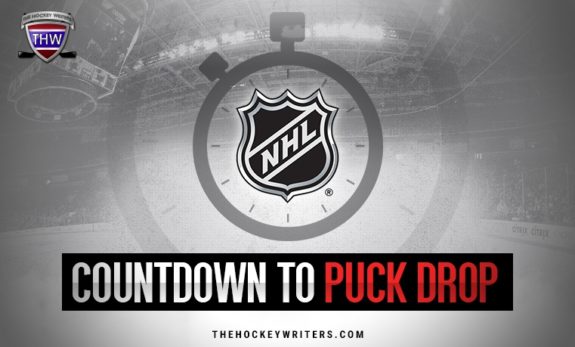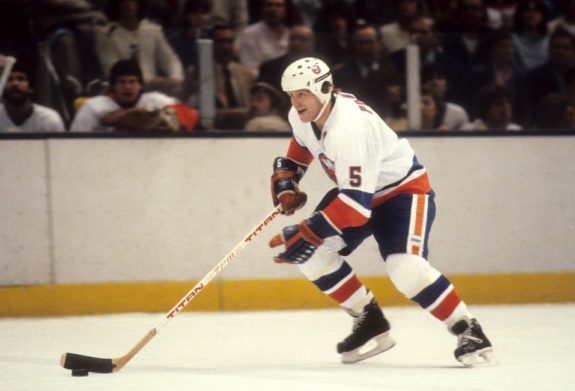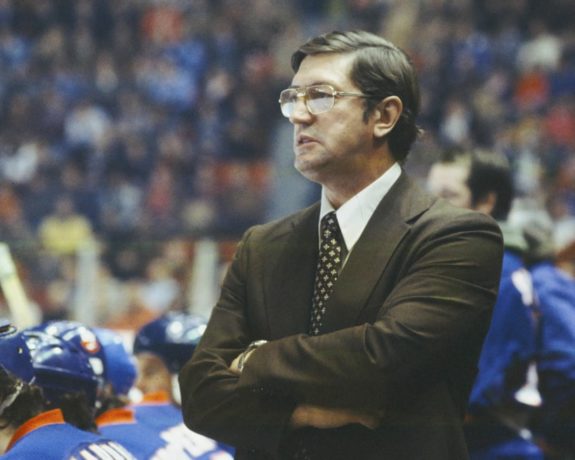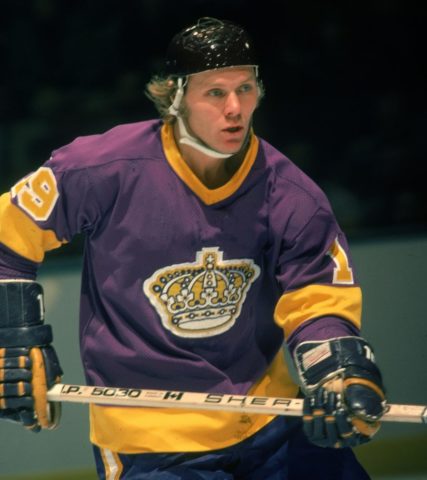Introducing The Hockey Writers’ Countdown to Puck Dropseries. From now until the puck drops on the 2019-20 NHL’s regular season on Oct. 2 when the Toronto Maple Leafs host the Ottawa Senators, we’ll be producing content that’s connected to the number of days remaining on that particular day. Some posts may be associated with a player’s number, while others will be connected to a year or length of time. We’re really excited about this series as we take you through the remainder of summer in anticipation of the return of NHL hockey.

There are 72 days until the puck drops on the 2019-20 NHL regular season. As a result, today’s post focuses on the beginning of the New York Islanders.
Part of the 1972 expansion that included the NHL’s first southern team, the Atlanta Flames, the Islanders were part of a league that was quickly growing its footprint. Just two years removed from its second expansion that added the Buffalo Sabres and the Vancouver Canucks, the NHL reached 16 teams for the beginning of the 1972-73 season.
The Islanders had a 12-60-6 record during their inaugural campaign, a tough start for the franchise. But, that last place finish allowed them to pick first overall the following season, when they selected defenseman Denis Potvin. From there, Bill Torrey, the Islanders’ general manager from 1972 to 1992, began to assemble one of the greatest teams in NHL history.
The Building Blocks of a Dynasty
In 1973-74, the Islanders only marginally improved, the first season under legendary head coach, Al Arbour. However, a number of players who would have a role in the Islanders’ future were already on the roster by that second season. Potvin, who led the team in scoring during the 1973-74 season as a defenseman, Billy Smith, Lorne Henning, Bobby Nystrom, Jean Potvin, Dave Lewis, Glenn Resch, and Billy Harris helped to create a winning culture on Long Island that quickly turned the Islanders into a perennial playoff team.
Led once again during the regular season by Denis Potvin’s 21 goals and 76 points, the first major step for the franchise came in the spring of 1975 with the team’s first playoff appearance. In a major upset, they defeated the New York Rangers in the first round, a symbolic moment in New York sports history.

Resch, who earned the majority of the starts during that playoff run, stumbled along with the rest of the Islanders in Game 2 at Nassau Coliseum following a tight 3-2 win at Madison Square Garden. With the three-game series tied at one game a piece, Arbour inserted Smith into the lineup for Game 3. A late third period flurry by the Rangers forced overtime, pushing a young Islanders squad to the brink, but it was the line of Ed Westfall, J.P. Parise, and Jude Drouin (the team’s leading scorers throughout the playoffs) that won the game for the Islanders, setting up an even more exciting second round.
The Comeback
At this point in NHL history, only one team had come back from a 3-0 series deficit to win a best-of-seven series, the 1941-42 Toronto Maple Leafs against the Detroit Red Wings. When the Islanders fell 0-3 to the Pittsburgh Penguins in the quarter finals, it was easy to count the Islanders out. They had different ideas, however. After a scrimmage prior to Game 4, Arbour brought his team together and said,
“If there’s anyone here who doesn’t feel we can come back and beat those guys, get off the ice immediately.”
Al Arbour, quoted from Maven’s Memories | NHL.com
This confidence from Arbour, coupled with a change in goaltenders, helped to spark one of the greatest comebacks in sports history. Smith, who had stolen the series against the Rangers, struggled against the Penguins during the first three games. Looking for any advantage, Arbour decided to go back to Resch, who wouldn’t disappoint. Led again by the line of Parise, Drouin, and Westfall, the Islanders went on a tear. Resch allowed only four goals over the final four games with a dazzling .969 save percentage.

This comeback helped launch something special on Long Island. The Islanders were beginning to understand how to win a playoff series just a few short years into their existence. The roster would go through some changes over the next few seasons leading to the Islanders’ first Stanley Cup, but they were still one piece away from greatness.
The Butch Goring Trade
The 1977-78 and 1978-79 seasons were letdowns. The Islanders finished first in the Eastern Conference in both campaigns, in the latter they were first in the NHL during the regular season. However, they couldn’t get beyond the second round of the playoffs. Something was missing from the lineup, and as reluctant as Torrey was to change the chemistry of his team, a move needed to be made.

Often referred to as the gold standard for NHL trade deadline deals, the Islanders acquired Butch Goring, a 29-year-old center from Manitoba, Canada, from the Los Angeles Kings in return for long-time Islanders Billy Harris and Dave Lewis in 1980. Both players spent their entire careers on Long Island to that point; Harris was the first draft pick in franchise history and Lewis was a second-round pick in 1973. Adding Goring to the lineup proved to be the missing piece, providing further scoring and scrappiness. He had 11 points in 12 games for the Islanders heading into the playoffs and added 19 points in 21 playoff games en route to the team’s first of four consecutive Stanley Cup victories.
Today’s Islanders are in a similar situation as the team of the late 1970s; just a player or two away from being a serious contender. With a drastic culture change and a head coach in Barry Trotz who knows how to win, the Islanders may be on the cusp of regaining their former glory. Can they find their missing piece?